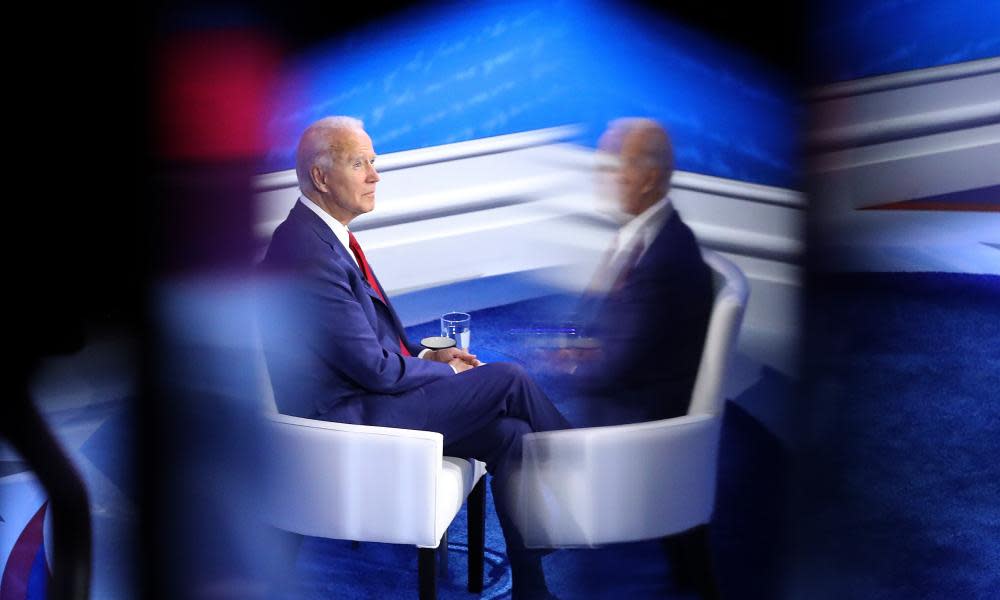'Things have changed': can Biden overcome the racist legacy of the crime bill he backed?

In 1994, Senator Joe Biden of Delaware stood proudly behind Bill Clinton as he signed into law a reform bill that touched nearly every aspect of the US criminal justice system.
Related: Trump trails Biden with two weeks to go – but there could yet be surprises
More than 25 years later, amid national protests against racial injustice in law enforcement, the Democratic presidential nominee is grappling anew with the implications of legislation he helped author and which experts say opened the door to an era of mass incarceration that devastated African American communities.
At a town hall in Philadelphia on Thursday night, Biden was asked by a voter about the legacy of the 1994 bill, which she said included “prejudice against minorities”, and what his view of the legislation was now.
Biden sought to defend the bill as a product of a different era, while arguing that elements of it were wrongly implemented.
Pressed by the moderator, George Stephanopoulos, to say if his support for the bill had been a mistake, Biden replied: “Yes, it was.
“But here’s where the mistake came,” he said. “The mistake came in terms of what the states did locally.”
In an eight-minute response, Biden said the bill passed with the support of the Congressional Black Caucus and Black mayors around the country. He noted that it contained the landmark Violence Against Women Act and an assault weapons ban.
Conditions were different now, he said, as activists demand an overhaul of policing and incarceration policies in response to police killings of Black Americans.
“Things have changed drastically,” Biden said.
Biden has pledged to decriminalize marijuana, a step short of calls to legalize the drug at the federal level. He has also said that if elected, he will expunge the records of anyone previously arrested for possession of marijuana and help divert those with minor drug convictions into treatment rather than jail.
Asked if he still believed, as he did in 1994, that more police officers on the streets meant less crime, Biden said he did – but only “if in fact they’re involved in community policing”.
Turning to calls from Black Lives Matter protesters to re-imagine or “defund” police departments, he reiterated his opposition.
On Friday, Donald Trump, who touts a criminal justice reform bill as one of his biggest accomplishments, seized on the issue, claiming Biden “freely used the term SUPER PREDATOR!!!” as he advocated for the passage of the 1994 crime bill.
That is false. In a 1993 speech, Biden warned of “predators on our streets”. But there is no record of him using the term “super predator”, which Trump repeatedly invoked in 2016, attacking Hillary Clinton for using the term 20 years before, a choice she said she regretted.
Bill Clinton has expressed regret over the crime bill, acknowledging in 2015 that it played a significant role in mass incarceration and sent even minor criminals to prison for “way too long”.
Biden’s reluctance to embrace sweeping police reform has frustrated some activists. Polling shows Biden draws overwhelming support from Black voters, who helped revive his primary campaign, and yet he has struggled to excite young and progressive African Americans.
In the town hall on Thursday night, a student from Pennsylvania referred to Biden’s comment this year that if African Americans “have a problem figuring out whether you’re for me or Trump, then you ain’t black”. Cedric Humphrey asked the former vice-president what he could say to persuade young, Black men, like himself, “who see voting for you as further participation in a system that continually fails to protect them”.
“First of all,” Biden said, “if young Black women and men vote, you can determine the outcome of the election. Not a joke.
“The next question is: am I worthy of your vote, can I earn your vote?”
Related: Wide Awakes: the Lincoln-era youth movement inspiring anti-Trump protests
Biden explained what he intended to do as president to reform the criminal justice system and reduce the racial wealth gap.
“That’s what got me involved in politics in the first place, a thing called redlining,” Biden said. “We can change so much, that we can do so much to change the circumstances to give people a real opportunity.”
Stephanopoulos asked Humphrey if Biden had answered his question.
“I guess so,” he said.
Sensing he had not yet earned Humphrey’s vote, Biden asked him to stay after the event was over, so they could speak more.
